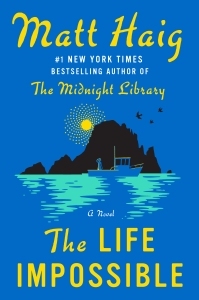The Life Impossible, by Matt Haig

The first Matt Haig novel I read was How to Stop Time, which I liked a lot. Next I read The Humans, which was and remains an absolute favourite for me. Both novels used fantastic elements (a person who ages more slowly than normal so lives for hundreds of years, and an alien coming to earth and living in a human body) to explore very real questions about what it means to be human, and what is the value in a human life despite its limitations and flaws.
I was eager to read 2020’s The Midnight Library, but was a bit let down by it. The concept was intriguing, the execution OK, but the ending was absolutely predictable from the first page, so I felt less compelled and engaged than with the previous books. It seemed to me like Matt Haig’s desire to write inspirational, self-help-y type fiction was winning out over his desire to write fantastic stories. My review of it from 2020 (linked above) says that the concept was great and I enjoyed reading it, both of which are true, but I was disappointed. However, I still enjoyed Haig’s writing enough to immediately pick up next book, The Life Impossible, which was just released this fall.
Unfortunately, the sense of let-down I experienced with The Midnight Library was much worse with this book. It’s the story of Grace, a 72-year-old retired math teacher who is living alone in England, grieving the recent loss of her husband and the more distant loss of her son, when an unexpected bequest from an old friend sends her off to the island of Ibiza. This seems like a good set-up for a “you’re never too old to re-invent yourself and discover the joy of being alive” story, with a few mysterious elements early in the story promising some of those fantasy/sci-fi/magic realism elements that Haig does so well.
And really, this is exactly what you get: Grace goes to Ibiza, learns to live and love again, explores the mystery of her old friend’s death/disappearance, encounters mysterious paranormal forces, and discovers she can do more than she ever dreamed possible. As a plot summary, it’s not bad — though again, a little predictable. However, in this one I found the writing really let me down. The paranormal elements of the story felt far less like “Let’s explore this fascinating idea” and more like “Let’s throw a bunch of vaguely New Age-y ideas at the wall and sea what sticks.” And there were long passages, some from Grace’s p.o.v., some spoken by other characters, and some in books that she reads within the book, that are both woo-woo and preachy. Sadly, this one really failed to hold my attention the way the earlier Haig books I read did.
However, lots of people loved The Midnight Library and many readers seem to be liking this one, so if this is a new direction for Haig, it may be one that works well for a lot of his readers. I’m just afraid that, for this book anyway, I’m not one of those readers.



